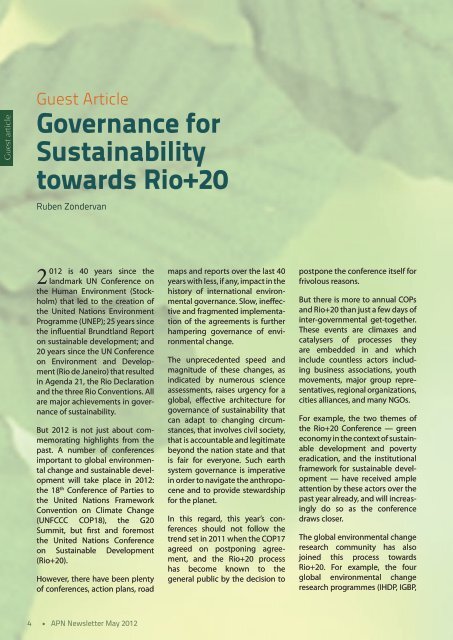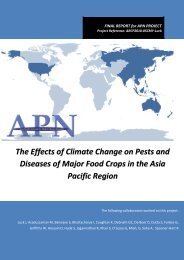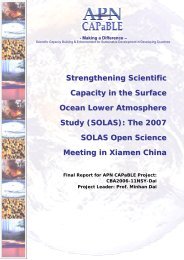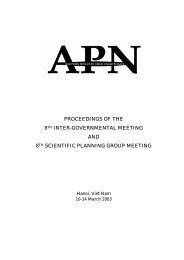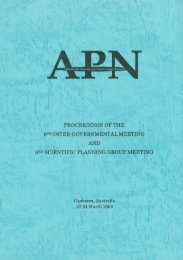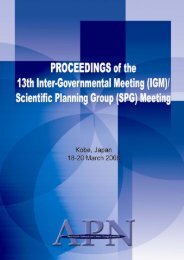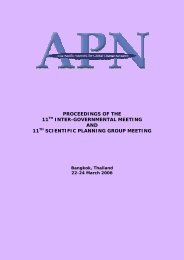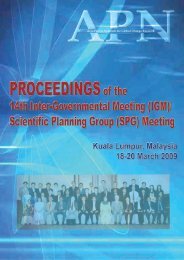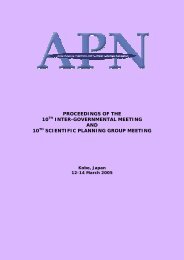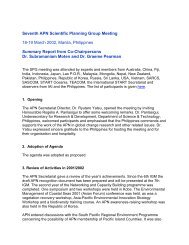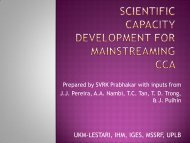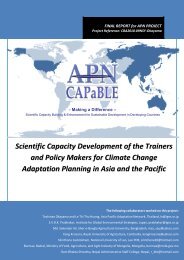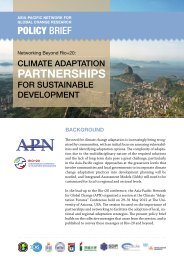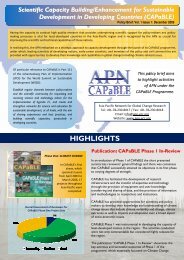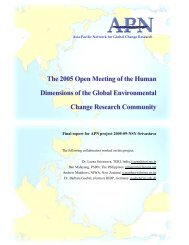APN Newsletter - Asia-Pacific Network for Global Change Research
APN Newsletter - Asia-Pacific Network for Global Change Research
APN Newsletter - Asia-Pacific Network for Global Change Research
Create successful ePaper yourself
Turn your PDF publications into a flip-book with our unique Google optimized e-Paper software.
Guest article<br />
Guest Article<br />
Governance <strong>for</strong><br />
Sustainability<br />
towards Rio+20<br />
Ruben Zondervan<br />
2012 is 40 years since the<br />
landmark UN Conference on<br />
the Human Environment (Stockholm)<br />
that led to the creation of<br />
the United Nations Environment<br />
Programme (UNEP); 25 years since<br />
the influential Brundtland Report<br />
on sustainable development; and<br />
20 years since the UN Conference<br />
on Environment and Development<br />
(Rio de Janeiro) that resulted<br />
in Agenda 21, the Rio Declaration<br />
and the three Rio Conventions. All<br />
are major achievements in governance<br />
of sustainability.<br />
But 2012 is not just about commemorating<br />
highlights from the<br />
past. A number of conferences<br />
important to global environmental<br />
change and sustainable development<br />
will take place in 2012:<br />
the 18 th Conference of Parties to<br />
the United Nations Framework<br />
Convention on Climate <strong>Change</strong><br />
(UNFCCC COP18), the G20<br />
Summit, but first and <strong>for</strong>emost<br />
the United Nations Conference<br />
on Sustainable Development<br />
(Rio+20).<br />
However, there have been plenty<br />
of conferences, action plans, road<br />
4 • <strong>APN</strong> <strong>Newsletter</strong> May 2012<br />
maps and reports over the last 40<br />
years with less, if any, impact in the<br />
history of international environmental<br />
governance. Slow, ineffective<br />
and fragmented implementation<br />
of the agreements is further<br />
hampering governance of environmental<br />
change.<br />
The unprecedented speed and<br />
magnitude of these changes, as<br />
indicated by numerous science<br />
assessments, raises urgency <strong>for</strong> a<br />
global, effective architecture <strong>for</strong><br />
governance of sustainability that<br />
can adapt to changing circumstances,<br />
that involves civil society,<br />
that is accountable and legitimate<br />
beyond the nation state and that<br />
is fair <strong>for</strong> everyone. Such earth<br />
system governance is imperative<br />
in order to navigate the anthropocene<br />
and to provide stewardship<br />
<strong>for</strong> the planet.<br />
In this regard, this year’s conferences<br />
should not follow the<br />
trend set in 2011 when the COP17<br />
agreed on postponing agreement,<br />
and the Rio+20 process<br />
has become known to the<br />
general public by the decision to<br />
postpone the conference itself <strong>for</strong><br />
frivolous reasons.<br />
But there is more to annual COPs<br />
and Rio+20 than just a few days of<br />
inter-governmental get-together.<br />
These events are climaxes and<br />
catalysers of processes they<br />
are embedded in and which<br />
include countless actors including<br />
business associations, youth<br />
movements, major group representatives,<br />
regional organizations,<br />
cities alliances, and many NGOs.<br />
For example, the two themes of<br />
the Rio+20 Conference — green<br />
economy in the context of sustainable<br />
development and poverty<br />
eradication, and the institutional<br />
framework <strong>for</strong> sustainable development<br />
— have received ample<br />
attention by these actors over the<br />
past year already, and will increasingly<br />
do so as the conference<br />
draws closer.<br />
The global environmental change<br />
research community has also<br />
joined this process towards<br />
Rio+20. For example, the four<br />
global environmental change<br />
research programmes (IHDP, IGBP,


